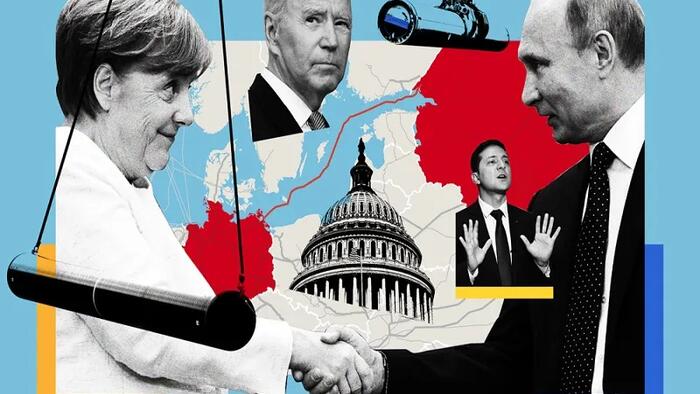In a recent interview with Tucker Carlson, former President Donald Trump sought to challenge ongoing accusations of his alleged ties to Russia, particularly in the context of the Nord Stream II pipeline’s fate. Trump asserted his role in preventing the project’s completion, declaring, “I killed it,” and emphasizing that his administration imposed sanctions against it, actions he believes counter the Democrats’ claims that he acted as a Russian agent. He highlighted the significance of Nord Stream II, the largest pipeline in the world connecting Russia to Germany and other parts of Europe, to illustrate the purported absurdity of the accusations against him. In his view, his decisive actions against the pipeline contradict the narrative of being a friend to Russia and instead illustrate a strong stance in favor of U.S. interests in Europe.
Trump’s assertion particularly referenced the paradox involving President Biden’s administration. After Trump declared sanctions against Nord Stream II to diminish Russia’s influence on European energy markets, Biden subsequently waived those sanctions in May 2021, just before his first meeting with Vladimir Putin. The Biden administration’s rationale for lifting the sanctions, despite opposition to the pipeline, was based on a judgment that sanctions would not halt its construction. Biden’s comments at the time suggested that because the project was nearly completed, imposing sanctions would not contribute to the desired diplomatic goals and might even jeopardize relationships with European allies, specifically Germany.
Amidst this diplomatic maneuvering, some analysts suggest that Biden’s decision to waive sanctions was a strategic gesture aimed at improving relations with Russia ahead of a pivotal meeting with Putin in Geneva. However, this approach may have ultimately revealed inconsistencies in U.S. foreign policy, especially given the backdrop of increasing military tensions in Eastern Europe. The ensuing geopolitical dynamics indicated that while the waiver may have been intended to lower Russian strategic defenses against NATO’s expansion, the subsequent rejection of Russia’s security guarantee requests later in the year led to a re-escalation of tensions and the eventual reimposition of sanctions just before Russia’s military actions in Ukraine.
The timing of these events reveals a complicated narrative regarding the U.S.’s positioning on Russia and the underlying motivations driving policy decisions. Critics argue that the inconsistency displayed by the Biden administration—in waiving sanctions only to reimpose them—may have further provoked hostility from the Kremlin. Trump’s ability to tie his sanctions against Nord Stream II back to his earlier stances on Russia serves as a tactical response to the criticisms aimed at his administration and may resonate with constituents who remain skeptical of the mainstream Democratic narratives on Russia.
While Trump’s comments about “killing” Nord Stream II garnered attention, the former president might not have fully unpacked the strategic implications of his argument regarding sanctions and Russia’s influence in Europe. Many surmise that Trump’s rationale extended beyond merely a boastful claim; it was also an effort to undermine the Democrats’ criticism using tangible aspects of foreign policy actions. The complexities of international relations and the intertwining of energy politics with diplomatic meetings create a critical backdrop to these discussions, yet Trump’s framing may have oversimplified a deeply intricate geopolitical landscape.
Ultimately, Trump’s statements serve as both a reaffirmation of his confrontational stance against Russia and an attempt to mitigate any lingering doubts among voters regarding his foreign policy positions. His narrative not only highlights the discrepancies between his and Biden’s administration’s policies but also seeks to reinforce the notion that his administration took decisive action against perceived Russian threats, counteracting the ongoing accusations of collusion that have plagued his political identity. Through this framework, Trump aims to solidify his image among undecided voters and remind them of the complexities and ramifications of U.S.-Russia relations, while simultaneously challenging the Democrats’ narrative around Russiagate.

